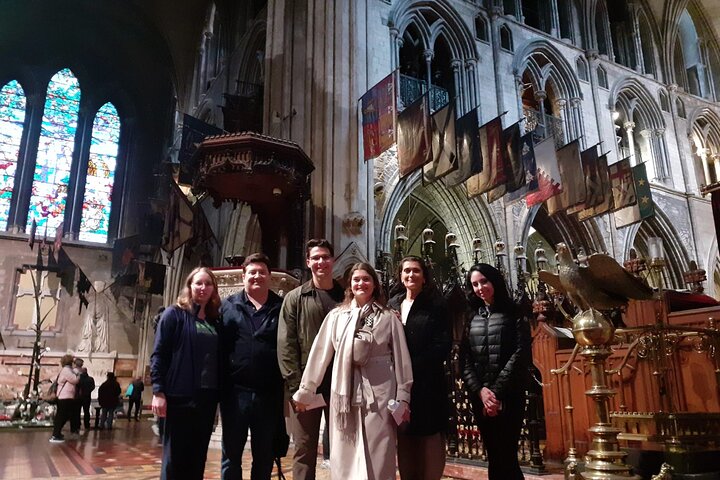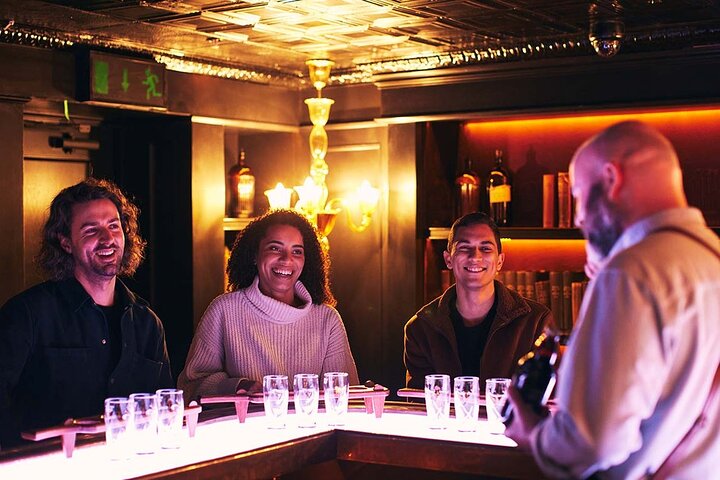Dublin History Walk: Conquest to Brexit in 2 Hours
120
Overview
The 2-Hour Historical Walking Tour from Dublin offers more than just a look at the city; it's a deep dive into Irish history led by knowledgeable history postgraduates. This walking tour explores the defining moments that have shaped Ireland.
Participants can expect to visit key locations like Trinity College, where the famous Book of Kells is housed (though entry is not included), and the historic Irish Parliament. The tour also stops at the lively Temple Bar area, the old Viking settlement of Wood Quay, and the impressive Four Courts. Other significant sites include Christ Church Cathedral, the Daniel O'Connell Statue, and Dublin Castle.
This tour gives a comprehensive overview of Ireland's past, from the English conquest and the impact of the American and French Revolutions to the Great Hunger, the fight for independence, the Northern Ireland Peace Process, and Brexit. All guides are history postgraduates.
Highlights
Expert-Led History Tour: Learn from history postgraduates for an in-depth understanding.
Key Historical Sites: See Trinity College, Dublin Castle & more iconic landmarks.
Comprehensive Irish History: Explore the English conquest to Brexit in just 2 hours.
Small Group Experience: Enjoy an intimate tour with personalized attention.
Sentiment Analysis
Overall, customers enjoy the in-depth historical knowledge shared by the guides and the comprehensive overview of Dublin's main historical sites, but some find the pace quick.

Customers say the tour guides are very knowledgeable and engaging.
Many people loved learning about Irish history from the expert guides.
Visitors found the tour to be a great way to see the main sites in Dublin.
Customers appreciated the guide's ability to explain complex history in a simple way.
Some customers mentioned that the tour moves at a fast pace.
A few visitors wished for more time at each stop.
The Journey
Trinity College
Begin your Dublin adventure at Trinity College, Ireland's oldest university, founded in 1592. Step through its iconic front gate and immerse yourself in centuries of scholarship and tradition. Don't miss the Long Room Library, a breathtaking repository of knowledge, and the Book of Kells, a stunningly illuminated 8th-century manuscript that showcases the artistry of early Christian Ireland. Feel the weight of history as you walk the same paths as literary giants like Jonathan Swift and Oscar Wilde.
Irish Parliament (Former)
Stand before the grand facade of the former Irish Parliament, a masterpiece of 18th-century neo-classical architecture. Originally built in 1729, this building served as the seat of Ireland's colonial parliament before the Act of Union in 1800. Reflect on its complex legacy as a symbol of 'Protestant Ascendancy' and a testament to a pivotal era in Irish history. Admire the architectural details that speak of power, ambition, and the changing fortunes of a nation.
Temple Bar
Explore the vibrant streets of Temple Bar, Dublin's Cultural Quarter. Once slated for demolition, this area was reborn in the 1990s as a hub for arts, music, and nightlife. Wander through its narrow cobblestone lanes, discover quirky boutiques, and soak up the lively atmosphere. In the evening, the district comes alive with traditional Irish music spilling out from the many pubs. This is a place for experiencing the modern spirit of Dublin whilst surrounded by reminders of its past.
Wood Quay
Delve into Dublin's Viking past at Wood Quay, the site of significant archaeological excavations in the 1980s. Here, the remains of the Viking city, founded in AD 840, were unearthed, offering a glimpse into the lives of the Norse settlers who shaped Dublin's identity. Imagine the bustling harbor and the longships that once docked here, bringing trade and tales from across the seas. It is a place to connect with the origins of the city.
Four Courts
Visit the Four Courts, Ireland's legal headquarters, an imposing building that has witnessed pivotal moments in the nation's history. It was here, in June 1922, that the Irish Civil War erupted, dividing a nation over the Treaty of 1921. Reflect on the turbulent years following the War of Independence and the sacrifices made in the struggle for Irish sovereignty. The rebuilt building stands as a symbol of Irish law and resilience.
Christ Church Cathedral
Step back in time at Christ Church Cathedral, Dublin's oldest cathedral, dating back to 1030. Rebuilt in stone in the 1170s by Strongbow, a key figure in the English invasion, this magnificent structure is a testament to Norman influence in Ireland. Explore its crypt, one of the largest in Britain and Ireland, and marvel at the architectural grandeur that has survived for centuries. This is a place to experience faith, art, and the enduring legacy of medieval Dublin.
Daniel O'Connell Statue
Pay homage to Daniel O'Connell, 'The Liberator,' at his statue located inside. As Dublin's first Catholic Lord Mayor in 1840, O'Connell spearheaded the successful campaign for Catholic Emancipation in 1829, ending discriminatory anti-Catholic laws. Stand in the presence of this Irish hero and contemplate his profound impact on Irish society and the fight for equality. The statue serves as a lasting tribute to his dedication and unwavering commitment to justice.
Dublin Castle
Explore Dublin Castle, originally built by King John in 1204, and the seat of British administration in Ireland until 1922. Walk through its opulent State Apartments, witness to centuries of power and intrigue. Discover the Dubh Linn (Black Pool) from which Dublin gets its name. The castle has evolved over the centuries and stands as a reminder of the shifting tides of history.
Know Before You Go
This historical walking tour includes the expertise of history postgraduate guides. It excludes entry to the Book of Kells. Please meet your guide at the designated meeting point; specific details will be provided after booking.
Hot Tip
Many customers have suggested wearing comfortable shoes, as this is a walking tour covering several historical sites. Bringing an umbrella or raincoat is also recommended, as Dublin weather can be unpredictable.





